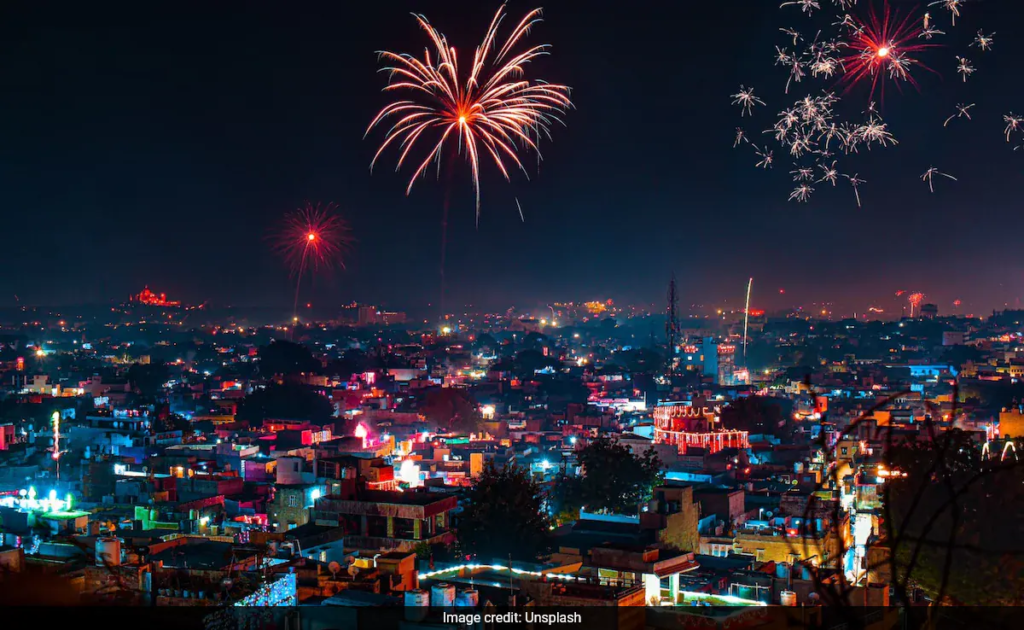Diwali, also known as the Festival of Lights, is one of the most celebrated festivals in India. It is a time when homes are decorated with lamps, families come together, sweets are shared, and prayers are offered for prosperity and happiness.
In this article, we will explore Diwali in India, its meaning, how it is celebrated, traditions followed, and why it holds a special place in the hearts of millions.

1. What is Diwali in India and Why is it Celebrated?
Diwali, or Deepavali, means “row of lamps.” It is celebrated to mark the victory of light over darkness and good over evil. Different regions in India have various stories associated with Diwali:
• In North India, it marks the return of Lord Rama to Ayodhya after defeating Ravana.
• In Western India, it celebrates the day Lord Vishnu sent the demon King Bali to rule the nether world.
• In South India, it marks the victory of Lord Krishna over the demon Narakasura.
No matter the story, the message of Diwali remains the same—celebrating hope, light, and goodness.
2. When is Diwali Celebrated in India?
Diwali is celebrated in October or November, depending on the lunar calendar. The festival lasts for five days:
- Dhanteras: People buy gold, utensils, and new items for their homes.
- Choti Diwali (Naraka Chaturdashi): Homes are cleaned, and lamps are lit.
- Diwali: The main day with Lakshmi Puja, lighting of diyas, and family gatherings.
- Govardhan Puja: Celebrated with prayers and preparing special meals.
- Bhai Dooj: A day to celebrate the bond between brothers and sisters.
3. How Diwali is Celebrated Across India
Diwali celebrations start with cleaning and decorating homes. People light diyas (oil lamps) and candles to welcome positivity. Rangolis are made at entrances using colourful powders and flowers.
In the evening, families perform Lakshmi Puja to seek blessings for wealth and prosperity. After prayers, sweets and snacks are shared with family and neighbours, and children enjoy lighting sparklers and small fireworks.
In cities, markets are brightly decorated, and people shop for gifts, clothes, and sweets to share the joy of the festival.
4. Traditional Sweets and Food During Diwali
Food is an important part of Diwali in India. Homes are filled with the aroma of traditional sweets and snacks, including:
✓ Laddoos
✓ Kaju Katli
✓ Gulab Jamun
✓ Chakli
✓ Namak Pare
✓ Gujiya
Families prepare these items together, adding warmth and togetherness to the celebrations.
5. The Importance of Lighting Lamps During Diwali in India
Lighting diyas during Diwali symbolises removing darkness and negativity from life. The light from the diyas is believed to guide Goddess Lakshmi into homes, bringing prosperity and happiness.
Apart from religious reasons, lighting lamps and decorating with lights bring families together and create a warm, positive atmosphere in homes.

6. Eco-Friendly Diwali: A Need of the Hour
While fireworks are a traditional part of Diwali, they cause pollution and harm the environment. Many families are now opting for eco-friendly Diwali celebrations by:
✓ Using clay diyas instead of electric lights to save energy.
✓ Avoiding or reducing fireworks to reduce air and noise pollution.
✓ Sharing sweets and gifts instead of spending on crackers.
✓ Planting trees as a part of Diwali celebrations.
An eco-friendly Diwali keeps the spirit of the festival alive while taking care of the environment.
7. How Diwali Brings Families Together
In today’s busy world, Diwali in India offers a reason for families to come together, celebrate, and share moments of joy. It is a time when people visit relatives, exchange gifts, and enjoy meals together, strengthening family bonds.
For children, it is a time to learn traditions, values, and the importance of togetherness while creating memories that last a lifetime.
8. Preparing for Diwali: What You Can Do
If you are planning to celebrate Diwali, here are simple steps:
✓ Clean your home to welcome positive energy.
✓ Decorate with diyas, candles, and rangoli.
✓ Prepare or buy sweets to share with neighbours and family.
✓ Light diyas in the evening and perform a simple puja.
✓ Spend time with your family, sharing stories and laughter.
Diwali does not require lavish celebrations; it is the warmth and positivity that matter most.
9. Diwali and Its Economic Significance
Diwali is also an important time for businesses in India. Markets are filled with customers buying gifts, clothes, and festive items. Many businesses consider Diwali as the beginning of a new financial year and perform Chopda Pujan (ledger worship) for prosperity.
The festival also supports small artisans who sell diyas, rangoli colours, and traditional decor items, helping sustain local crafts.
10. Final Thoughts: The True Spirit of Diwali
Diwali in India is more than lights and sweets; it is about spreading joy, sharing with those in need, and welcoming new beginnings. It reminds us to remove darkness not only from our homes but also from our hearts.
As you celebrate Diwali, remember to share happiness with others, take care of the environment, and embrace the values of kindness, gratitude, and togetherness.













Leave a comment